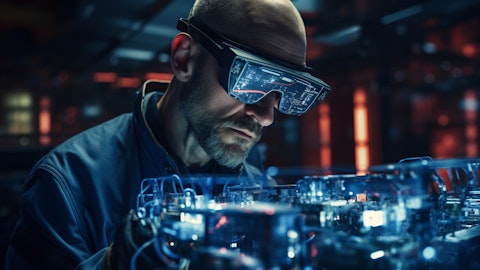In this article, we discuss the 10 best battery stocks to buy now according to short sellers. We also discuss the latest updates around the electric vehicle and battery market.
Electric vehicles are the latest trend in the automotive market which is revolutionizing the whole industry. According to Grand View Research, the global electric vehicle (EV) market was valued at $1.07 trillion in 2023 and is projected to grow at a compound annual growth rate (CAGR) of 33.6% from 2024 to 2030 and reach $8.85 trillion by the end of the forecast.
The growth is driven by government policies, incentives, and advancements in battery technology, which are making EVs more affordable and appealing. The transportation and logistics sectors are increasingly adopting EVs due to their lower emissions and operational costs, with companies like Amazon integrating electric trucks into their fleets.
Similarly, Grand View Research believes that the global EV battery market was valued at $44.69 billion in 2022 and is projected to grow at a CAGR of 21.1% from 2023 to 2030. Strategic collaborations among battery manufacturers, e-mobility providers, and energy suppliers are improving battery durability and lifespan, while the increasing production of EVs in countries like China, Germany, and Japan, along with government investments in EV charging infrastructure, is further accelerating the market. However, fluctuating raw material prices, such as lithium-ion, could impact production costs.
The Growing Importance of Critical Minerals in Energy Transition
According to BP’s Energy Outlook 2024, the transition to a low-carbon energy system will require a substantial increase in the use of critical minerals, such as copper, lithium, and nickel, essential for supporting the infrastructure and assets needed for this transition. According to the report, the rapid expansion of electric vehicles is projected to reach 1.2 billion (current trajectory) to 2.1 billion (goal to reach Net Zero) by 2050, which will significantly increase the demand for batteries and in turn, higher demand for minerals like lithium and nickel.
Copper demand is expected to rise by 75-100% by 2050, mostly due to its use in EVs and the extension of electricity networks. Lithium demand could grow 8 to 14 times by 2050, mainly driven by its use in EV batteries, which will account for about 80% of total lithium demand by 2050. Lastly, nickel demand is projected to increase two to three times by 2050, with most of this growth linked to lithium-ion batteries in EVs.
How Competitive Pricing and Leasing Are Shaping the EV Market
In an interview at CNBC Power Lunch, Erin Keating, Cox Automotives executive analyst, explored the factors shaping the EV market. She noted that Tesla and Chevy initially dominated EV sales, which is why a growing supply of used cars from the former is now available. These used EVs have become more affordable, partly due to tax credits of up to $4,000. This is helping to drive sales in the used EV market and making it a more attractive option for consumers.
However, the lease market is offering deals that compete with used EV prices. According to Keating, while this puts downward pressure on used EV prices, she emphasized the benefit of the situation and said that more leased vehicles today will enter the used market in a few years, which will ensure a steady supply of affordable used EVs in the future.
Keating also addressed the issue of buyer’s remorse, as some people are frustrated with the slower development of EV infrastructure and range anxiety. Despite this, she reassured consumers that the batteries in used EVs are holding up well with minimal degradation.
It means consumers can trust the longevity of these vehicles, and automakers are committed to supporting them. Although some challenges remain, she believes that as infrastructure improves, consumer confidence and adoption of EVs will continue to grow.
With that, we take a look at the 10 Best Battery Stocks To Buy Now According to Short Sellers.

10 Best Battery Stocks To Buy Now According to Short Sellers
Our Methodology
For this article, we used stock screeners and ETFs including Amplify Lithium & Battery Technology ETF and Lithium & Battery Tech ETF to identify companies involved in the EV battery market. We then selected 10 stocks with the smallest short interest and listed them in descending order of their short interest. We also mentioned the hedge fund sentiment around each stock which was taken from Insider Monkey’s database of over 900 elite hedge funds.
Why are we interested in the stocks that hedge funds pile into? The reason is simple: our research has shown that we can outperform the market by imitating the top stock picks of the best hedge funds. Our quarterly newsletter’s strategy selects 14 small-cap and large-cap stocks every quarter and has returned 275% since May 2014, beating its benchmark by 150 percentage points (see more details here).
10 Best Battery Stocks To Buy Now According to Short Sellers
10. Lucid Group, Inc. (NASDAQ:LCID)
Short Interest as % of Shares Outstanding: 10.94%
Number of Hedge Fund Holders: 14
Lucid Group, Inc. (NASDAQ:LCID) is an American company that focuses on the design and production of EVs and advanced powertrain systems. The company was founded in 2007 as Atieva and was focused on electric vehicle batteries and powertrains. In 2016, it was rebranded as Lucid Motors and started designing high-performance, all-electric vehicles.
The company sells its EV under the name of Lucid Air, while Lucid Gravity, its all-electric SUV is expected to be available by the end of 2024. In addition to its own vehicle production, the company develops and supplies powertrain systems to other automakers, such as Aston Martin. This diversification shows its role in the broader EV and battery market. It is one of the best battery stocks to buy now.
On August 5, Lucid (NASDAQ:LCID) announced a significant financial move as it secured an additional $1.5 billion in funding from its major shareholder, Saudi Arabia’s Public Investment Fund (PIF).
This new investment includes $750 million from the sale of convertible preferred stock and another $750 million from a delayed draw loan facility provided through an affiliate, Ayar. This funding follows a previous $1 billion investment from PIF in March, which brings their total investment in the company to about $8 billion.
The $1.5 billion in funding is significant for Lucid (NASDAQ:LCID), which will help cover both its investment in new projects and ongoing operational expenses as it scales up production for the Gravity SUV. This financial backing sets the stage for the company to expand its reach and target a broader segment of the market, moving beyond its current focus on premium electric sedans.
Lucid (NASDAQ:LCID) was held by 14 hedge funds in the first quarter and the stakes amounted to $30.4 million. SCGE Management initiated a position with 5.1 million shares worth $13.35 in the quarter and is the largest shareholder of the company, as of June 30.
9. Sigma Lithium Corporation (NASDAQ:SGML)
Short Interest as % of Shares Outstanding: 10.22%
Number of Hedge Fund Holders: 20
Sigma Lithium Corporation (NASDAQ:SGML) focuses on exploring and developing lithium resources in Brazil. It is a key player in the lithium-ion battery supply chain, especially in the electric vehicle industry worldwide. The company fully owns several properties, including Grota do Cirilo, Genipapo, Santa Clara, and São José, which together cover around 185 square kilometers in Minas Gerais, Brazil. It takes the 9th spot on our list of the best battery stocks to buy now according to short sellers.
Sigma Lithium (NASDAQ:SGML) has made environmental, social, and governance (ESG) principles a core focus. It emphasizes on protecting local ecosystems, contributing positively to surrounding communities, and playing a significant role in the global transition to electric energy. It achieved Net Zero in 2023.
The company also showed its strong market position in the second quarter as it raised its sales volume and achieved prices that were 10% higher than those of its competitors. Sigma Lithium (NASDAQ:SGML) generated a revenue of C$62.86 million, which was up nearly 69% sequentially. Moreover, the company cut its cash costs by 22%, increased its profit margins to 54%, and surpassed its financial goals.
On August 29, the company secured a BRL 487 million (1 BRL = US$ 0.18) development loan from Brazil’s National Bank for Economic and Social Development (BNDES) to fully fund the construction of its Second Greentech Carbon Neutral Plant in Brazil. The company has already begun construction and expects to complete it by the summer of 2025.
The 16-year loan, with a low 7.45% interest rate, is a key part of Sigma Lithium’s (NASDAQ:SGML) strategy to double its production capacity of environmentally sustainable lithium concentrate from 270,000 tonnes to 520,000 tonnes annually. The company’s CEO, Ana Cabral said that the support of BNDES strengthens the company’s leadership in the global lithium market and its impact on Brazil’s “Lithium Valley,” transforming the once impoverished region into a thriving hub for lithium production.
In the second quarter, 20 hedge funds had stakes worth $89.1 million in Sigma Lithium (NASDAQ:SGML). Appian Way Asset Management is the company’s most prominent shareholder with 2.6 million shares worth $31.3 million, as of June 30.
8. NIO Inc. (NYSE:NIO)
Short Interest as % of Shares Outstanding: 9.25%
Number of Hedge Fund Holders: 20
NIO Inc. (NYSE:NIO) is making notable strides in the EV sector with its innovative approach to both vehicle design and energy solutions. The company is engaged in designing, developing, and selling smart electric vehicles in China while also providing a range of power solutions. These include home charging systems like Power Home, a battery swapping service known as Power Swap, and a variety of other charging options such as Power Charger, Destination Charger, and Power Mobile.
A standout feature of the company’s offerings is its Battery as a Service (BaaS) model. This approach allows customers to buy the company’s vehicles without the battery, which reduces the upfront cost. Instead, customers can lease the battery, gaining the advantage of accessing the latest battery technology as it evolves. This model not only lowers the initial purchase price but also provides flexibility for customers who can upgrade their battery packs as new innovations become available.
Its Power Swap technology is another key element of its approach. The company has developed a system that enables drivers to quickly exchange depleted batteries for fully charged ones at dedicated swap stations. This process, which takes just three minutes, addresses one of the major challenges of EV ownership, long charging times. With over 2,400 battery swap stations currently operational in China, the company plans to expand this network by adding 1,000 more stations in 2024, aiming for a total of over 3,000.
On the technological front, NIO (NYSE:NIO) is advancing its battery capabilities with the development of 4680 battery cells and lithium manganese iron phosphate (LMFP) batteries, which offer improved energy density and performance.
Recently, the company began mass production of its 150 kWh semi-solid-state batteries. These batteries are expected to improve both energy density and safety and will be featured in several NIO models, starting with the ET7 sedan, which has a driving range of over 1,000 kilometers on a single charge.
The company’s battery swap technology has already achieved 50 million cumulative swaps, which is evidence of its popularity among consumers who prefer it over traditional charging methods. This service has saved users more than $2.85 billion compared to gasoline-powered vehicles.
Additionally, as the number of new energy vehicles grows, approximately 20 million batteries are projected to reach the end of their eight-year warranty period between 2025 and 2032, according to the company. This potential wave of costly battery replacements could drive more consumers toward its battery leasing and swapping options.
Overall, NIO’s (NYSE:NIO) innovative battery solutions and its comprehensive power infrastructure position it strongly in the evolving EV battery market. Its efforts to improve battery technology, expand its swap station network, and position in the market place the company among our best battery stocks to buy according to short sellers.
At a stake value of $82.117 million, 20 hedge funds held positions in NIO (NYSE:NIO) in the second quarter. As of Q2, Point72 Asset Management is the top shareholder in the company and has a position worth $26.89 million.





